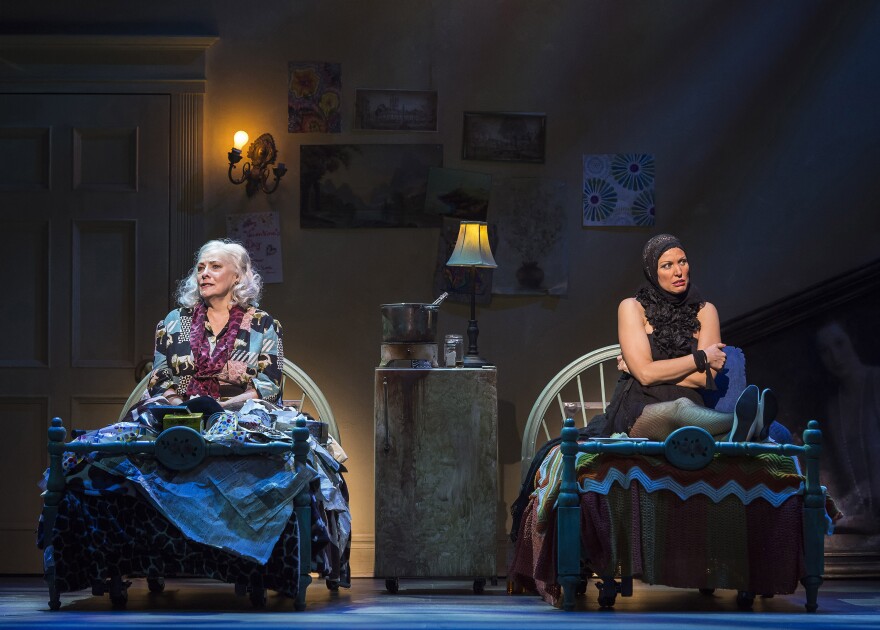Betty Buckley offers a feminist take on Edie Bouvier in the musical "Grey Gardens," adapted from the Maysles brothers documentary of the same name; musician Ruben Guevera recounts a life in rock and roll; movie marketing in a time when real violence is all too prevalent.
Betty Buckley's feminist take on the musical, 'Grey Gardens'
When filmmaking brothers David and Albert Maysles brought their camera into a decrepit mansion in East Hampton in the early 1970s to film Edith Ewing Bouvier Beale and her daughter, Edith Bouvier Beale, they couldn't know that the story would go on to fascinate people for generations. But it has.
Their documentary film, "Grey Gardens," which followed the two eccentric women — known as Big and Little Edie — living in near-poverty among cats and memories, has spawned an HBO film and a stage musical.
The two Edies were an aunt and first cousin of Jacqueline Bouvier Kennedy, but had fallen out of touch with much of the family and come to live in squalor, co-dependently tied to each other.
A version of the stage musical is now at the Ahmanson Theater in Los Angeles, with Rachel York as Little Edie and Betty Buckley as Big Edie.
https://www.youtube.com/watch?v=u5HceVBSMoo
Buckley visited The Frame this week. The long-time actress, who won a Tony for her work in the original Broadway production of "Cats," shared her secrets of staying fit to perform on stage, and her insights into the mother and daughter in "Grey Gardens."
ON HER PRE-SHOW RITUALS:
I work out every day for a minimum of an hour, but mostly when I have the time, two hours. Then my vocalise takes 30 to 45 minutes, and then you've got to plan your eating schedule. You've got to eat an early supper so that you're not dizzy with hunger when you go on stage, but at the same time you're not belching your dinner up between musical notes. So it takes really careful planning and organization. Then I meditate. I'm a meditator for years and years, so there's a process of meditation and prayer and surrender and really acknowledging where you're at. If you're tired, if you're upset about something, you're really taking responsibility for your emotional state. Then surrendering that so that you can lend yourself or your soul, as it were, the experience of the character.
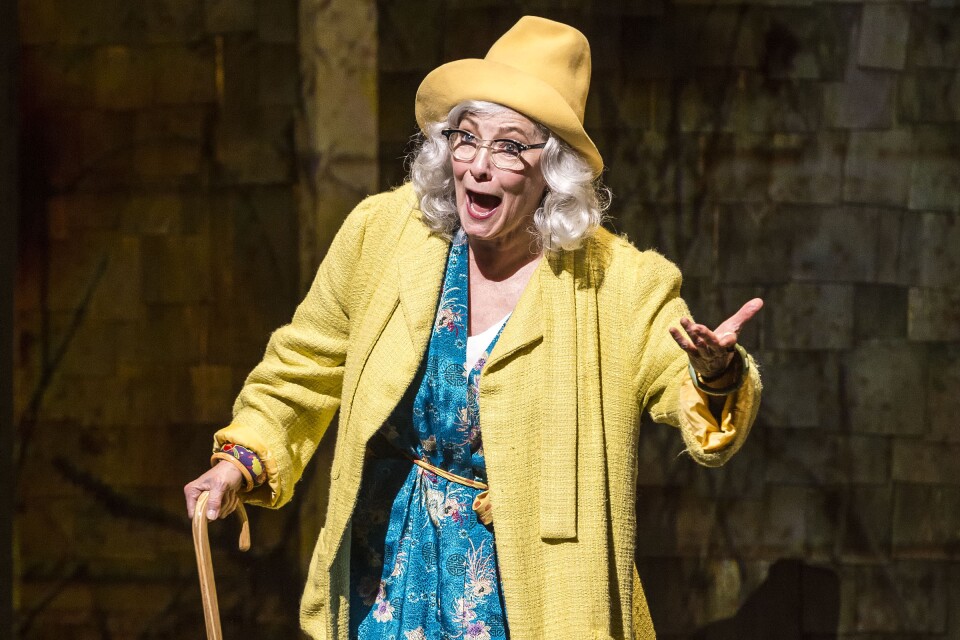
ON BIG EDIE:
The one thing she owned was this beautiful house, this beautiful property, Grey Gardens, in East Hampton. It was in her name and she lived on the Bouvier trust for years when her husband abandoned her. But she was this privileged daughter of high society and then she married a wealthy man. She was a singing prodigy from age 10. Her father was very reluctant to have her do that.
Women of a certain social status were meant to be wives and mothers. They were not taught a skill and were not taught how to make a living, but she had this bohemian spirit — she was an artist and she was not allowed to really express that. She did so in the social milieu of her house and her family. She sang and gave concerts in her house. She had this ongoing relationship with this wonderful pianist and composer, [George Gould Strong]. He was gay and all of this was really frowned upon. The father just had had enough and didn't want anything to do with that. He abandoned them. And she had two sons as well. From my understanding of the things I've been told is, they kind of washed their hands of her after a while because they really wanted her to sell the house and move to Florida to a retirement community and she wouldn't do it. She was just really stubborn in holding on to all of that.
She reminds me of a pioneer woman. My grandmother, Myrtle Buckley, grew up in South Dakota and she homesteaded her own land in South Dakota's territory before it was a state. Then she married my grandfather, Norman C. Buckley, who was Kid Buckley and was a real cowboy. Myrtle drove the chuck wagon on the cattle drives. I just feel that there's something about a kind of stalwart resilient spirit that made [Big Edie] hold on to the land and she wasn't going to let it go, no matter what, even as it crumbled around her. Her daughter got pulled into that.

ON THE DYNAMIC BETWEEN BIG EDIE AND LITTLE EDIE:
I think it was a very mutual co-dependency. Little Edie did have a lot of years in New York where she tried to be in show business. She worked for her father and his law firm. She was not successful at that. She tried to be a model for a while. She got involved with a married man and he broke her heart. She went back home to East Hampton to recover. Then her mother became ill, had some eye surgeries and it went downhill from there. And the brothers were not helping out and the father had abandoned them. I think, Little Edie, similarly, was this bohemian spirit, a really outlandish personality who had some of her own issues. Then the two of them became really immeshed in this co-dependency. I don't think Big Edie is entirely responsible for that. I think it was a collaboration.
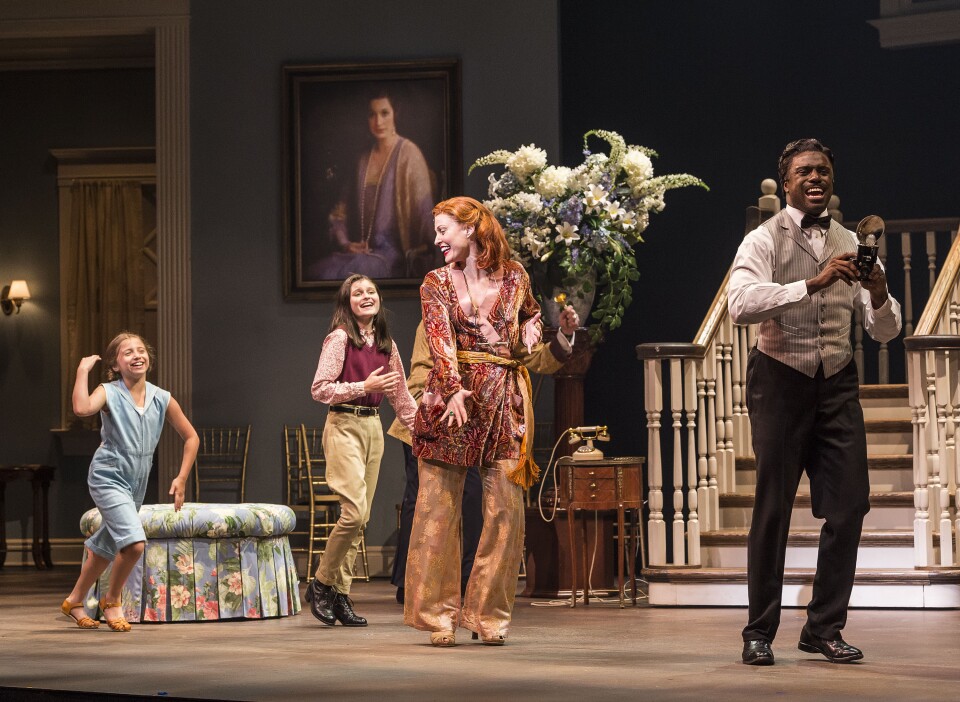
ON THE FEMINIST READING OF "GREY GARDENS"
A lot of feminists at the time of the documentary spoke at great length from the feminist perspective — how the repression, culturally, on these two women with these artistic spirits and how they simply weren't allowed to be themselves and had not been trained how to make a living. It's like, What do you do? We worked against all of the writing that wants us to believe that the mother was this demon mother that made this happen. We really tried to play the opposite on that throughout the play.
For information on tickets to see "Grey Gardens" at the Ahmanson Theater, click here.
Singer Rubén Guevara goes reeling in the years in a new solo stage show
Once upon a time, rock 'n roll legend Frank Zappa turned an unknown L.A. musician named Rubén Guevara into a bonafide rock star of the '70s. But Guevara's musical journey first got a jumpstart in 1965 on the popular national TV music show, "Shindig!"
Guevara was known as “Jay P. Moby” on "Shindig!" The show producers asked the East L.A. native to change his name to get back at another performer who had quit the series. Guevara didn’t really want to, but he figured it was his first shot at fame. Guevara recalls:
The [Rolling] Stones were on there. James Brown. Everybody, man. So it was a big honor. Bo Diddley was one of my main inspirations when I was little, so that was really cool. We shared the same dressing room. And Tina [Turner], of course. I had my eye on her, but I was looking around for Ike! She was just in her 20s. Beautiful, of course. I was 20 or 21.
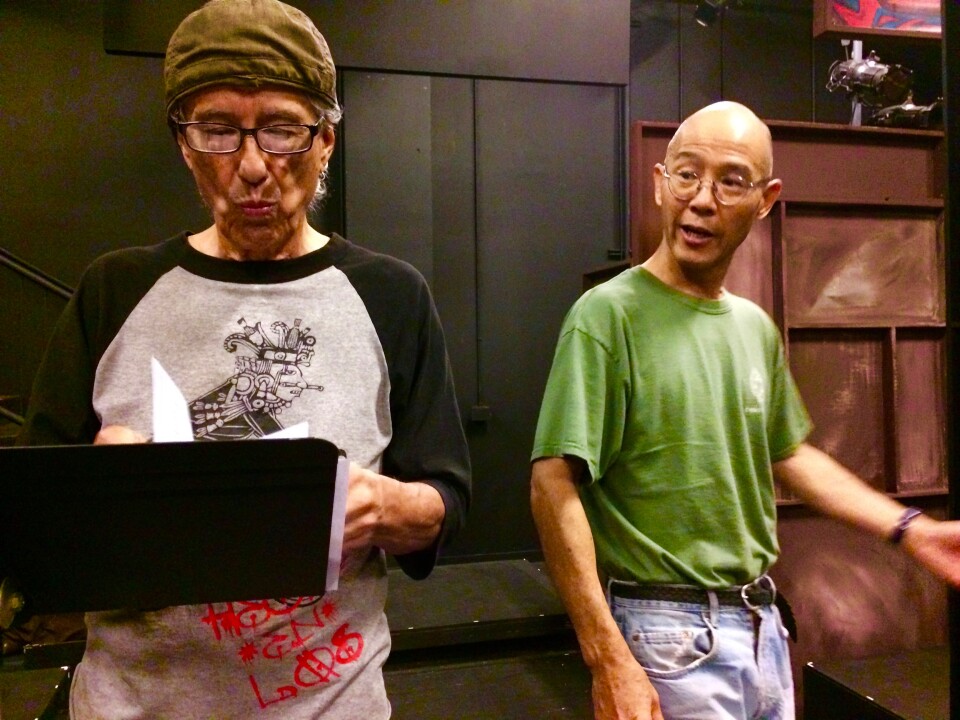
Guevara’s mother, Sarita Vara, was as actress. She knew one of the producers on "Shindig!" so she helped him get an audition. Guevara booked a gig immediately. It looked like his career was swiftly on its way as he crooned right alongside some of music's biggest names.
“For the finale of the show, I did a duet with Bo Diddley,” Guevara says. “A Rufus Thomas song called ‘Can Your Monkey Do the Dog?’”
The TV execs loved Guevara’s voice and offered him a regular spot in the cast. But the show was soon canceled and Guevara got his first taste of showbiz defeat. Guevara laughs as he recalls that period:
I wound up working at Chicken Delight — on the Sunset Strip no less, man! That’s just rock 'n' roll. That’s show business right there! The funniest thing is that there was a worker there. He came up at to me and he said, Hey man, didn’t I see you on Shindig last month? I said, Yeah, yeah. He said, What are you doing here? I said, What’s it look like? I’m battering chicken, making coleslaw. I gotta pay the rent!
Fifty years later, despite a career peppered with ups and downs, Guevara is still chasing his dreams at the spry age of 73.
Backstage at the CASA 0101 theater in Boyle Heights, Guevara warms up his voice for rehearsal. He takes the stage this month in his new solo show that recounts the highs and lows of his life in music. It’s called "Confessions of a Radical Chicano Doo-Wop Singer."
You don’t often read the words “radical Chicano” and “doo-wop” in the same sentence. But Guevara has long claimed both his cultural and musical identity with equal fervor.
As for doo-wop, it’s a music genre that showed up on urban American street corners as early as the 40’s. Guevara grew to love that sound as a boy. He’s been singing it ever since. Which brings us back to the story about how he met and toured with Frank Zappa. Guevara says:
He put a record out called "Cruising with Ruben & the Jets." It’s kind of a doo-wop parody record. My girlfriend showed me, so we went to see him in concert at the Shrine Auditorium in ’69, it was the release concert for the record. I dug the show, it was cool so I wanted to go backstage and shake his hand. I walked up to him and said, Thank you for doing that doo-wop music in this crazy psychedelic period. And by the way, my name is Ruben and I used to sing doo-wop!
As Guevara tells it, Zappa replied: “That’s a grand name.”
A few years go by. Ironically, I met a musician who worked with Frank. I told him I had just done a rock theater piece and he said, Well, you should meet Frank. He’s into rock theater. I’m going up to his house tonight. Would you like you come along? Sure! Hell yeah! We were up all night playing his collection of R&B records. Eventually, we got to talking about modern composers. I was interested in Stravinsky and Bartok. So was he!
Bartok and Stravinsky used folk music intertwined into their classical compositions. I told him I thought Ruben and the Jets was a musical theater idea — kind of Chicano/Mexican American folk music presented in a theatrical way. So then he asked me, How would you like to put together a real Ruben and the Jets? We’ll tour, I’ll produce the album and you can open for us!
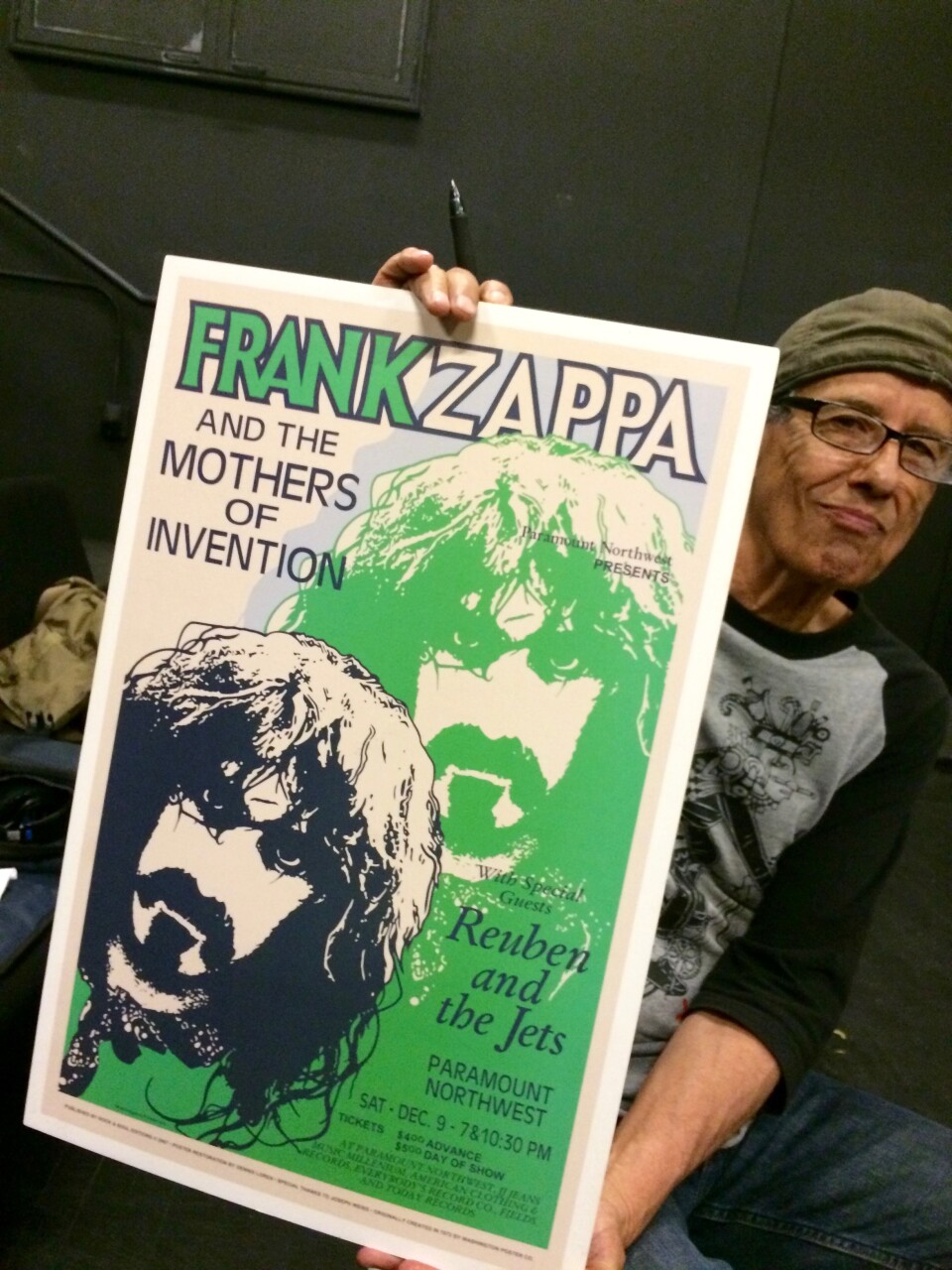
Guevara gave it some thought and realized he’d be a fool to pass up Zappa’s offer. It was 1973 and Guevara combined his talents in theater and music to create a fictional character, the front man of a real band called Ruben and The Jets, inspired by Zappa’s fictional band. Guevara quickly became a true rock-star living the high-life. He and his new band toured with Zappa, the Mothers of Invention and other big name acts such as Three Dog Night.
They released two albums with Zappa’s help: "For Real!" and "Con Safos." But the music, the tours and the fame all evaporated. Band members started bickering, other projects came calling, and the curtain came down on Ruben and the Jets.
Over the decades, Guevara never stopped singing or acting. Under the watchful eye of theatre director Dan Kwong, the hard-working performer isn’t letting up as he prepares for his show. Kwong says it’s important for Guevara not to underplay his courageous tenacity:
His highs are so high and therefore the falls are crashes. He’s [gone from performing] for 40,000 people in a baseball stadium to delivering fried chicken. How do you not give up? How do you keep moving forward? How do you hold onto your vision, or adjust your dreams when something isn’t working? There’s something about watching someone crash and burn over and over again that’s kind of cathartic. And you think, Wow, if he can survive that, what can’t I survive? (Laughs)
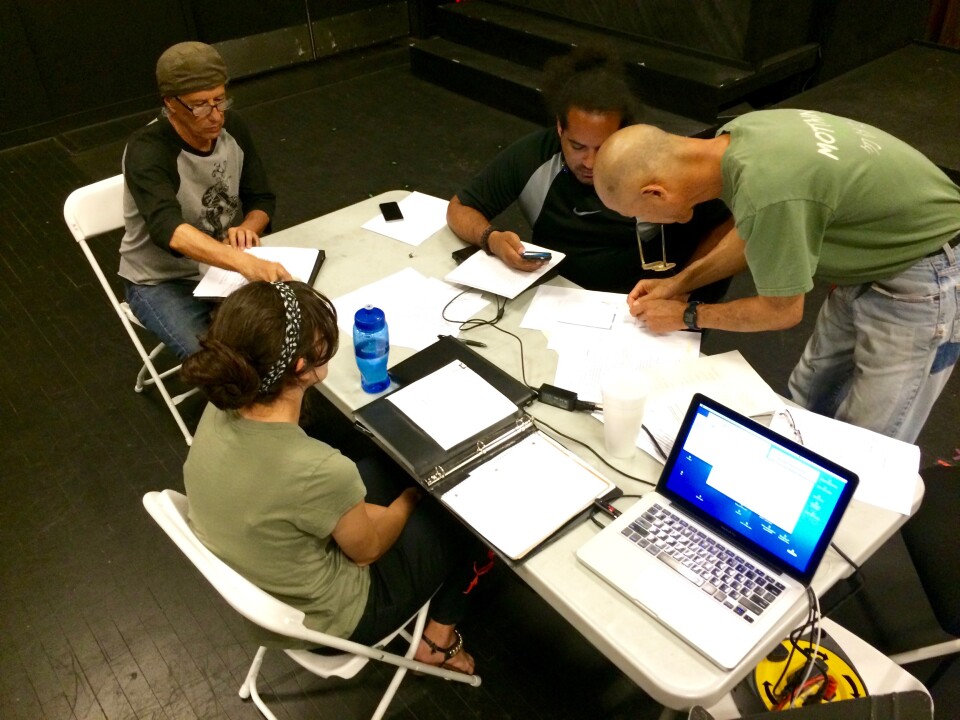
Perhaps his fellow Chicano actor, Cheech Marin, gives the best nod to Guevara’s survival skills at the end of the film "Up In Smoke.” Guevara was also in a bunch of Cheech & Chong movies, but that’s a whole other story you’ll have to hear at his show. In the meantime, here’s how Marin put it in the movie:
Wow, did you hear that crowd when they gave us a standing ovation, man? We are going to have a bad band. We had them eating right out of their hands. Wow! We are going to be big, man — really big, man. We are gonna like, be bigger than Ruben and The Jets, man, I bet you!
Nowadays, if you ask Guevara, the man once known as the star of Ruben and The Jets says we can simply call him Funkahuatl. It’s a made up name combining the words funk and Nahautl, which was the Aztec language. The moniker seems perfect. After all, Nahuatl means “pleasing to the ear.”
Rubén Guevara’s one-man show, "Confessions of a Radical Chicano Doo-Wop Singer," is at CASA 0101 theater in Boyle Heights. The show runs Fridays-Sundays through July 31.



